Struggling to find keywords? Well, that struggle ends today.
In this short but sweet post, you’ll learn how to properly find keywords for your business to rank for on Google.
You can also use the same process to find Google Ads keywords (although there are slight differences between the two types of keywords and what you should look for; more on that later).
NOTE: This post will show you how to find MONEY keywords, how to evaluate the keywords your current SEO agency has ranked you for and whether or not those keywords actually lead to revenue.
Let’s get into it.

~9 Minute Read
Quick Answer
The quickest way to find keywords for your industry is to use your Google Business Profile category. Go to Mangools.com and select KWFinder. Enter your city as a location and search for "your Google Business Profile category" + [city name]. Example: water damage restoration service Miami, plumber Miami, roofing contractor Miami, and so on. Mangools will then show you a list of dozens (if not hundreds) of keywords, which you can then simply export to a CSV document. Those are your money keywords.
What Are Keywords?
For those who are brand new to SEO, the term “keywords” might be unfamiliar.
Keywords refer to searches, phrases, or terms people use to find specific information, products, or services on Google.
- is water damage harmful? would be looked up by anyone who wants to learn more about water damage and its hazards
- dehumidifiers for sale would be typically searched by TWO types of people – homeowners and business owners – looking to buy a dehumidifier.
- water damage repair Miami would be searched by anyone looking for a water restoration company in Miami
There are a few different types of keywords out there (we’ve pretty much outlined them above, but here are their “official” SEO names).
Types of Local SEO Keywords
Informational Keywords
The keyword we outlined about water damage being harmful is a typical example of an informational keyword.
However, not all informational keywords are equal. Some are more “valuable” to rank for than others, and here is why:
- Informational keywords can be searched for at different stages of the user’s sales cycle. We’ve mentioned this a few times on this blog, but there are top-of-funnel, middle-of-funnel, and bottom-of-funnel keywords, with is water damage harmful? keyword being close to the top of funnel.
- A middle-of-funnel keyword would be something like metal roofing vs asphalt roofing or should you install solar batteries with solar panels? – these keywords confirm the user’s interest in a product or service and ranking for them would serve the purpose of further funneling the user down the sales cycle.
- Bottom-of-funnel keywords could be metal roofing price or solar panel installation price. You get the drill by now, these are the last “layer” of keywords somebody would search before moving onto the types of keywords we will cover next – commercial keywords (solar panel installation Miami).
Now, a thing to note about informational keywords is that they can be quite difficult to rank for local businesses UNLESS they’re localized – solar panel installation costs IN MIAMI.
Google is already doing a great job localizing informational keywords (by “localization,” we mean showing search results for informational keywords from local businesses and not big websites like EPA.gov, Healthline, and others; each industry has its own “big sites”).
For instance, look up the keyword “is mold harmful?” and check the top websites.
GOOD LUCK! Regardless of how big a business you are, you’re VERY UNLIKELY to outrank all the .gov websites, Healthline, WebMD, and other huge publications which all populate the first page.
Have this in mind. But still, there are many informational keywords in many industries you guys can take advantage of.
Commercial Keywords
Commercial keywords are Google-d by people who want to buy a product or service, splitting them into two types:
- Service-based commercial keywords: roof repair Miami, solar panel installation Miami, water damage repair Miami
- Product-based commercial keywords: dehumidifiers for sale, solar panels for sale, mold removal spray for walls
There are businesses that both sell products and services, and their SEO strategy would be split into ranking for service-based keywords locally and product-based keywords nationwide or statewide.
And then there are companies that sell internationally, but that’s a story for another day.
Navigational Keywords
These keywords are simple – a user wants to find something.
- CVS contact us page
- Bank of America toll-free number
- [ABC Local Brand] address
Transactional Keywords
Transactional keywords could be put under commercial, but they’re their own type because these are considered the keywords Google users search EXACTLY when they’re about to buy something:
- Buy Air Force 1s
- Buy LG tv
- Buy new tires Costco
You’d want to consider these if you sell products locally, as some people Google buy Air Force 1s NEAR ME.
How Funneling With Keywords Grows Your Revenue
These different keyword types might confuse you, as you likely do not really understand the end goal – capturing as many users from different stages of their sales cycle and funneling them down YOUR own sales funnel.
What is a sales funnel? The term refers to the phase from when a potential customer starts getting interested in a certain topic or finding an answer to their question, desire, or concern to purchasing a product or a service that satisfies them and their needs.
Our goal as SEOs who actually know what they’re doing is to try to “funnel” as many Google users as possible down their sales funnel through OUR articles and offers.
We’d do this by ranking for all informational and commercial keywords we can, and then, through our content, CTAs (call-to-actions), and interlinking, convince the user that YES, they should install a metal roof over an asphalt roof and that OUR business is perfect for that job.
Picture this. You do a great job with your SEO, and rank for a term roofing contractor {your city} and similar.
Let’s say that the keywords you ranked for all combined get around 2,000 searches a month, and that, through our math, you get around 20-30 leads a month.
These a great results, but by capturing an equal “search volume” (monthly number of searches for a particular keyword) of 2,000 from informational keywords, you could add 4-5 more leads to your sales system.
How?
Because somebody looking up the differences between metal and ashpalt roofing is somewhat interested in the roofing service itself. Through our content, value propositions, and other sales tactics, we could show those people that we’re the authority in the roofing field because we know the ins-and-outs of all of their questions, including the ones they haven’t even asked yet.
Then, once that person finally decides to buy a new roof, they’ll remember us. And even if they still look up roofing companies in {their city}, we’d still be there, and then they’re sold on our business.
It takes an average of 7 interactions with a prospect for them to convert to our lead and book an appointment (learn more about the “Marketing Rule of 7“).
So, the more we interact with them in the different stages of their sales funnel, the higher the chance of us converting those prospects into our leads.
How to Do Keyword Research
Finally, now we get onto the actionable steps.
🥷 Ninja Tip! 🥷
Look up all services you're selling with a "near me" modifier - "mold remediation near me," "fire damage restoration near me," "carpet cleaning near me," "commercial cleaning near me," "crime scene cleanup near me," and others, and then search all of them again but put [your city name] instead of "near me" to get the full picture. This all quickly adds up to hundreds or even thousands of potential leads per month per location for most industries.
The ninja tip says it all. Start by looking up all of the services you’re selling like this in Mangools KW Finder.
Here’s what the research looks like in action:
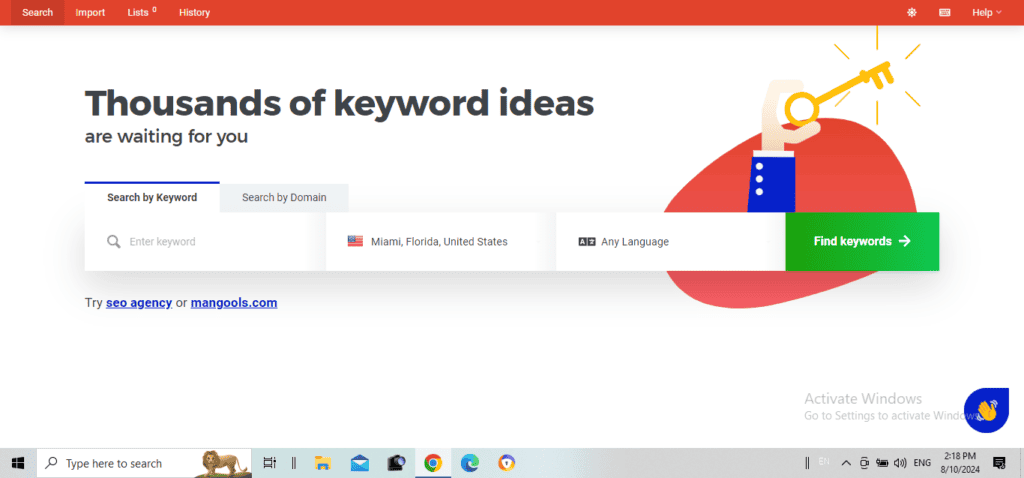
Let’s quickly explain the fields:
- Under “Search” on the upper left bar, all your research will go on. “Search by keyword” is the option in the main bar you’ll use, and always make sure to set the location to {your city}, {your county}, {your state}, or {your country} in the location bar inside the main bar, depending on whether you’re researching a city-based, state-based, or national keyword.
- “Import” option in the upper left bar can be used to research multiple keywords at once, but if you’re just starting out, you likely do not have a keyword list.
- “Search by domain” can be used to look up what your competitors rank for, but we find that option less reliable for us.
So, now that you know how to use Mangools KWFinder, let’s get into the research phase.
It’s as simple as entering a keyword you have in mind – start with your Google Business Profile category name and add either {your city} or “near me” modifiers.
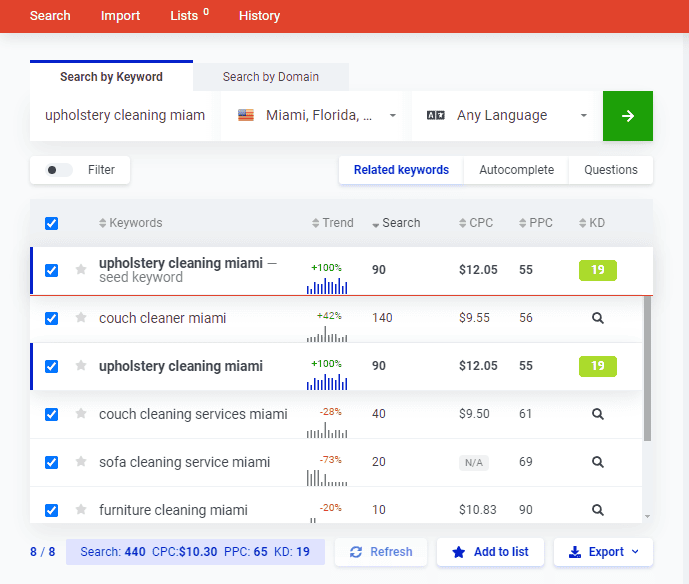
This is the excerpt you’ll see on the left side of your screen. You’ll also see this on the right.
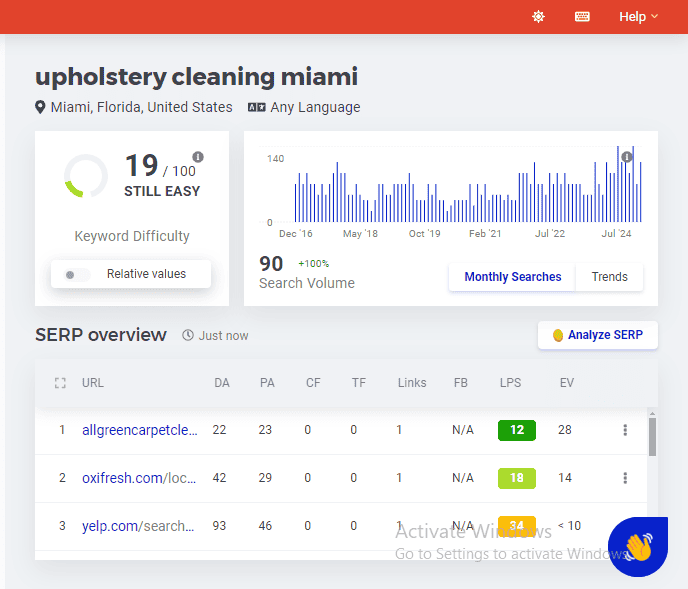
Let’s go back to the first image.

Now, let’s go over these fields here:
- “Search” refers to “search volume” phrase we mentioned earlier – the number of monthly searches for a particular term that’s selected. So, in Miami, there are around 90 different people who Google upholstery cleaning Miami every month.
- “Keywords” are, well, keywords (the one you looked up AND related) used on Google.
- “CPC” and “PPC” are Google Ads metrics that can be VERY valuable for your SEO. If the CPC is high, it means there’s money to be made. CPC refers to “cost-per-click,” which is a piece of data that tells us how much Google advertisers are bidding on average to get displayed at the top of Google for a given keyword. The higher it is, the more advertisers are bidding for it, and they wouldn’t be bidding that much if they weren’t making a better return. “PPC” isn’t the field that will provide you with much additional value.
- “KD” is the SEO difficulty score of a given keyword. The higher it is, the harder it is to rank. The lower it is, the easier it is to rank. Usually, anything below KD 15 can be ranked very quickly, while KDs 15-25 are still very achievable, but it will take a little bit of work.
- Use “export” button to quickly download all of the keywords displayed.
🥷 Ninja Tip! 🥷
Keywords with high CPCs and low KDs are your gold mine. This relation means that companies are making a lot of money from Google Ads but that not many of them invest in SEO, leading to SEO being both easy and lucrative.
Use Google Business Profile Services
Refer to our Google Business Profile optimization guide, and find the part where we mention the “Services” section of Google Business Profile.
For many categories like roofing contractors, plumbers, and HVAC contractors, Google will have a ready list of services you can add.
Well, use those services as keywords, enter them into Mangools, and calculate your search volume, AKA demand (to learn how to do this, check our post on how local SEO increases profits).
These keywords are your MONEY KEYWORDS, AKA commercial intent keywords with high purchase intent. They are as close to transactional keywords as one can get.
Finding Informational Keywords
Seen this?
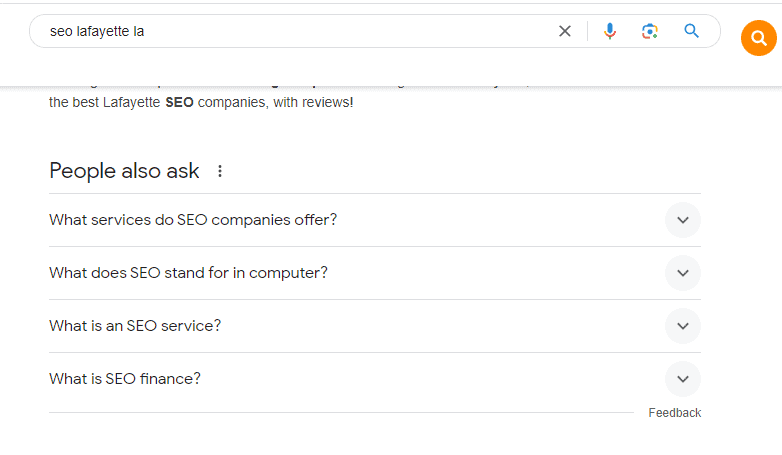
This section by Google is a gold mine for finding informational keywords.
Look up your money keywords like I did, and find this “People also ask” section. See the different questions people ask, and those are your informational keywords.
🥷 Ninja Tip! 🥷
To squeeze out as many keywords from "People also ask" as possible, simply click each question and Google will display a few more questions after each of your clicks.
Now, the trick here is knowing how much demand these is for finding an answer to each of these questions.
Well, repeat the same steps inside Mangools KW Finder. Look at KD scores.
Make sure to localize the search if applicable to see how many people are Google-ing those questions in YOUR area.
What if There's No Search Volume?
This is where knowing the industry comes into play.
Think about it – every home in every town, regardless of how big or small, has a roof, a plumbing system, siding, windows, doors, and more.
Even if Mangools shows no data, like they do here:
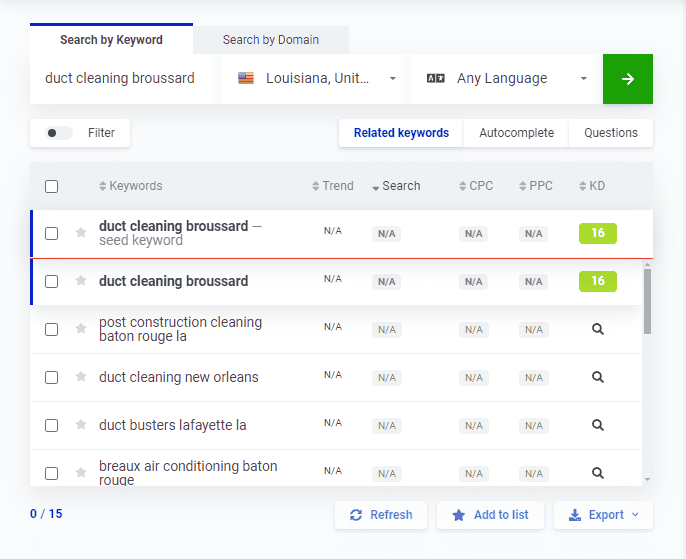
Doesn’t mean that there is no real demand. In fact, there almost always is:
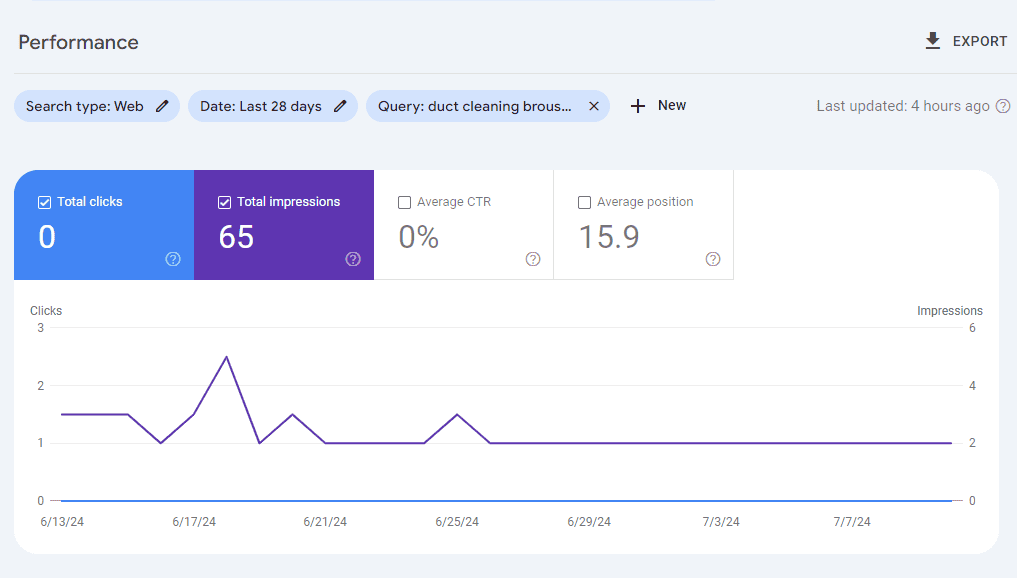
This is an excerpt from Google Search Console, where Google hides no searches from you. Inside GSC, you’ll see actual search volume for all keywords you targeted, as Mangools usually underestimates actual demand. Keep that in mind.
In the example we used, Mangools said no one looks for duct cleaning in Broussard, while Google shows around 60 people per month looking for duct cleaning in Broussard.
What to Do from Here
There is a lot to digest here. Your next steps would be to theme the keywords you found and develop a content plan you’ll take action on.
Theming your keywords involves multiple steps:
- Grouping all the keywords you can rank for with ONE piece of content
- Grouping all the keywords you want to rank for OVERALL with your entire website
- Developing a content plan from there
But that’s a story for another day. Stay tuned for more of our posts, as we’ll cover these topics in the coming articles.
In the meantime, head over to our free SEO audit page if you want all of this done for you FOR FREE, skipping the hassle of keyword research and getting all of the data handed to you on a silver platter, followed by a video explanation of how to utilize the data to tweak your existing website to rank higher.
Good luck!

Bogdan is a local SEO expert with over 3 years of experience helping businesses grow using Google. When he is not helping businesses grow, he works on his own SEO projects, works out, takes long walks, and watches Suits, which is completely ironic given how rarely he dresses up in a suit himself.
